Special Report
These Passports Get You Into the Most Countries
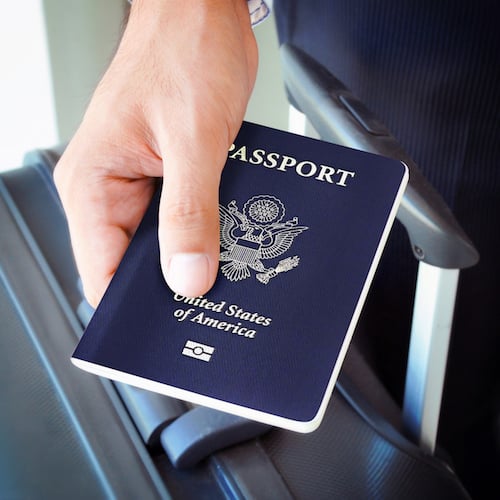
Published:
Last Updated:

The world has grown more and more interconnected. Today’s businesses and nations rely on cooperation with other nations, as well as collaborations with businesses and people outside their own borders. But citizens of some countries have a much easier time traveling the world than others.
Nomad Capitalist, an organization focused on worldwide asset diversification, created the Nomad Passport Index as a way to rank countries based on the usefulness of their passports. Specifically, the index ranks countries based on how easy it is for their citizens to move freely between countries. It also considers their exposure to overseas taxes as well as the rights they are granted domestically.
24/7 Wall St. reviewed the Nomad Passport Index for 2018 to determine the world’s 25 strongest passports. It may come as a surprise to Americans, but the United States failed to make the top 25, coming in 35th, tied with Slovenia.
Click here to see the passports that give owners the most freedom to travel
Click here to see our detailed findings and methodology

25. Norway tied — 24th
> Visa-free travel permitted to: 177 countries
> Dual citizenship: Usually not allowed
> Annual int’l departures: 8.03 million (1.53 per capita)
> GDP per capita: $70,666
[in-text-ad]

24. Austria tied — 24th
> Visa-free travel permitted to: 177 countries
> Dual citizenship: Not allowed
> Annual int’l departures: 11.53 million (1.32 per capita)
> GDP per capita: $49,371
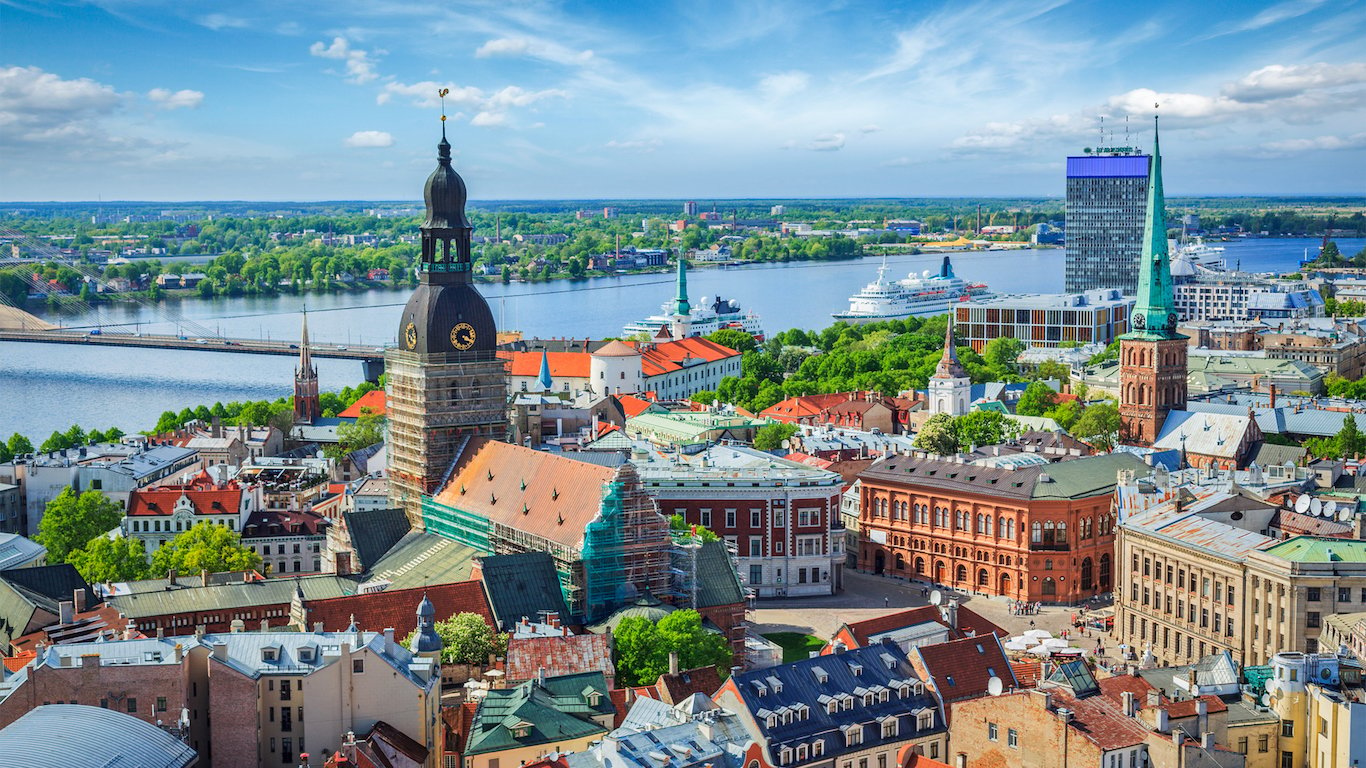
23. Latvia 23rd
> Visa-free travel permitted to: 170 countries
> Dual citizenship: Allowed
> Annual int’l departures: 1.94 million (0.99 per capita)
> GDP per capita: $27,190

22. United Kingdom 22nd
> Visa-free travel permitted to: 177 countries
> Dual citizenship: Allowed
> Annual int’l departures: 70.82 million (1.08 per capita)
> GDP per capita: $44,001
[in-text-ad-2]

21. South Korea tied — 20th
> Visa-free travel permitted to: 178 countries
> Dual citizenship: Allowed; some restrictions
> Annual int’l departures: 22.38 million (0.44 per capita)
> GDP per capita: $39,447

20. Singapore tied– 20th
> Visa-free travel permitted to: 180 countries
> Dual citizenship: Not allowed
> Annual int’l departures: 9.47 million (1.69 per capita)
> GDP per capita: $90,724
[in-text-ad]
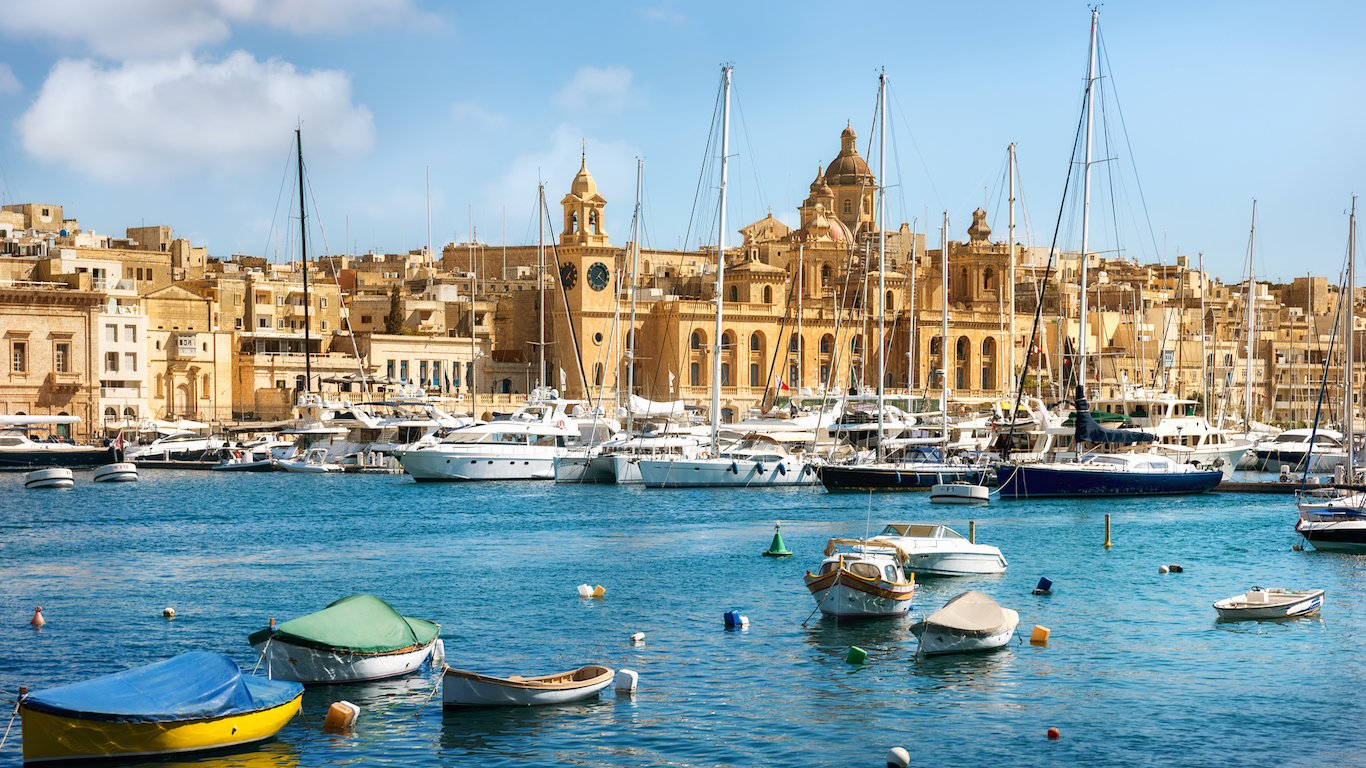
19. Malta 19th
> Visa-free travel permitted to: 173 countries
> Dual citizenship: Allowed
> Annual int’l departures: 0.50 million (1.14 per capita)
> GDP per capita: $42,239
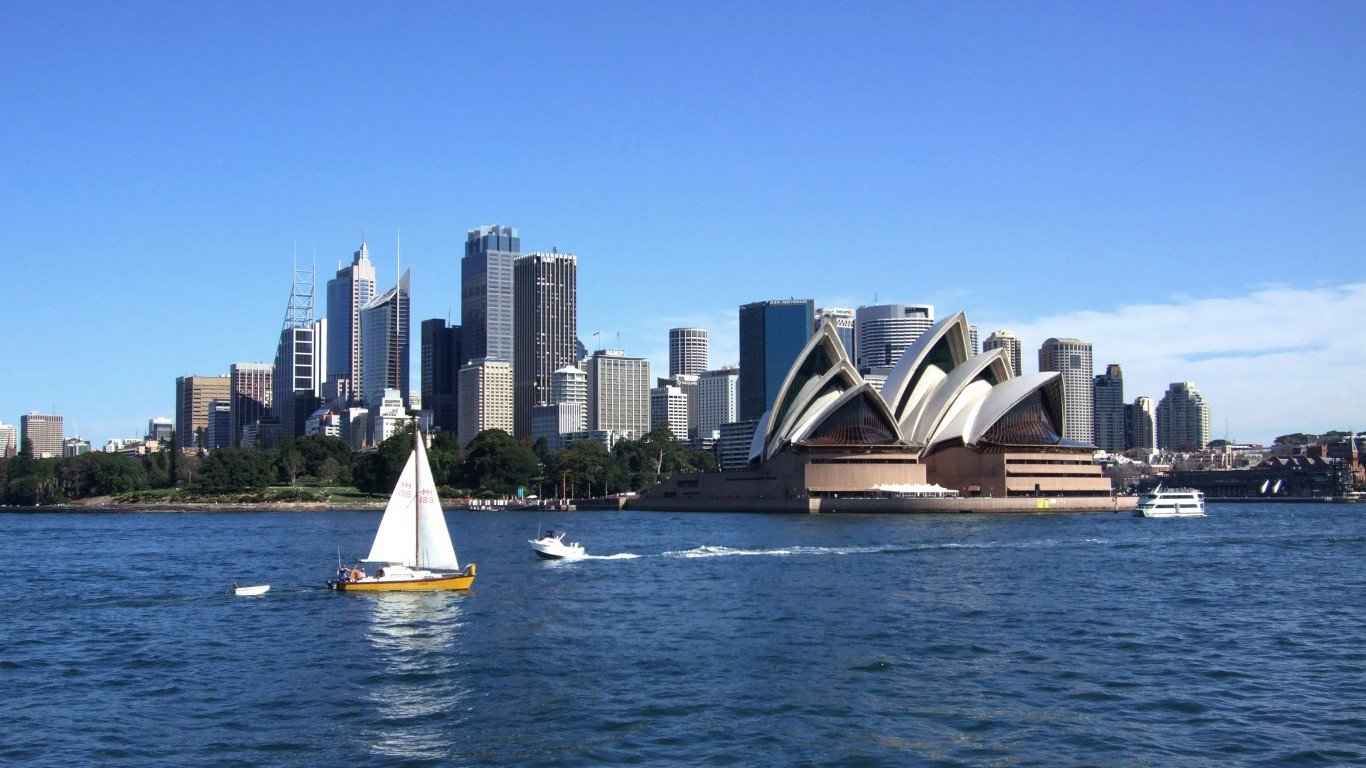
18. Australia tied — 17th
> Visa-free travel permitted to: 174 countries
> Dual citizenship: Allowed
> Annual int’l departures: 9.93 million (0.41 per capita)
> GDP per capita: $50,817

17. Canada tied — 17th
> Visa-free travel permitted to: 176 countries
> Dual citizenship: Allowed
> Annual int’l departures: 31.28 million (0.86 per capita)
> GDP per capita: $47,771
[in-text-ad-2]

16. Czech Republic tied — 15th
> Visa-free travel permitted to: 173 countries
> Dual citizenship: Allowed
> Annual int’l departures: 6.03 million (0.57 per capita)
> GDP per capita: $34,849

15. Netherlands tied — 15th
> Visa-free travel permitted to: 177 countries
> Dual citizenship: Usually not allowed
> Annual int’l departures: 17.94 million (1.05 per capita)
> GDP per capita: $53,139
[in-text-ad]
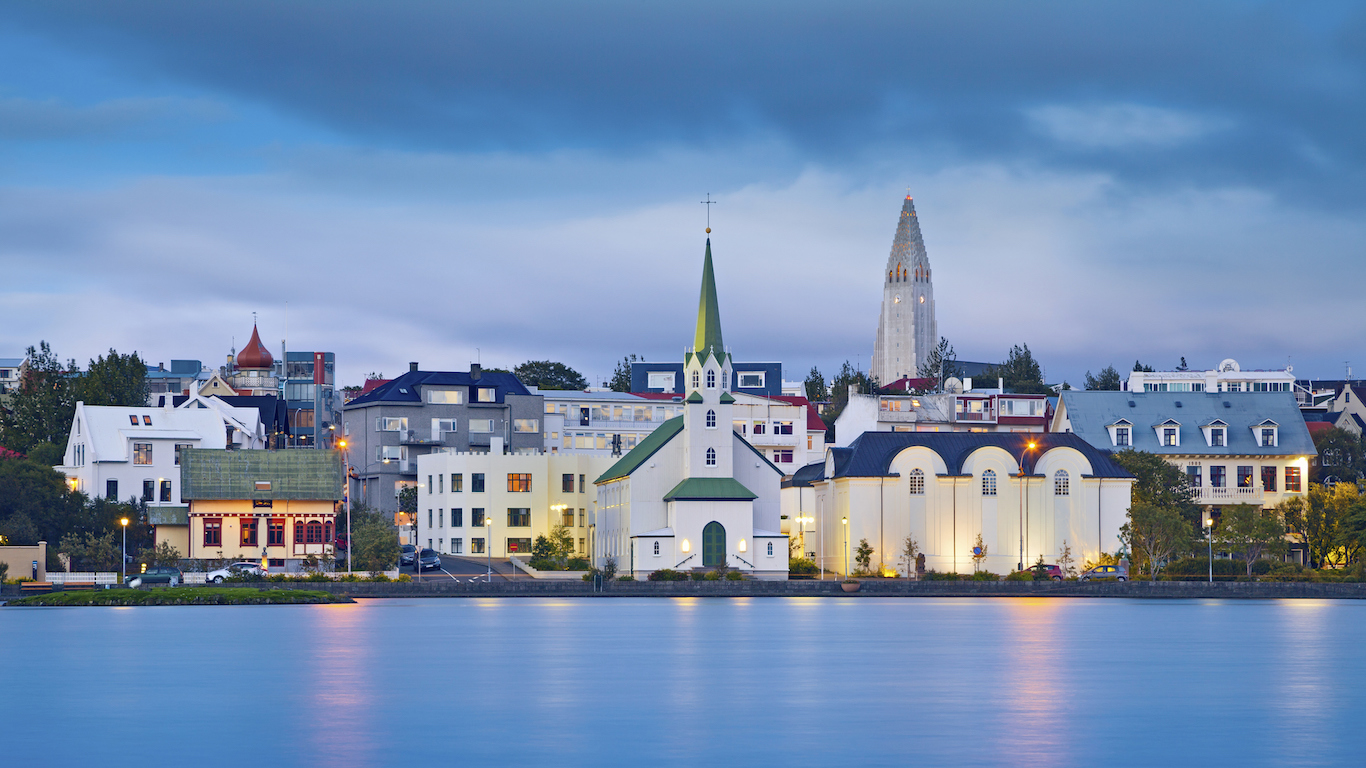
14. Iceland tied — 12th
> Visa-free travel permitted to: 172 countries
> Dual citizenship: Allowed
> Annual int’l departures: 0.54 million (1.59 per capita)
> GDP per capita: $52,496

13. France tied — 12th
> Visa-free travel permitted to: 178 countries
> Dual citizenship: Allowed
> Annual int’l departures: 26.48 million (0.40 per capita)
> GDP per capita: $43,653

12. Belgium tied — 12th
> Visa-free travel permitted to: 174 countries
> Dual citizenship: Allowed
> Annual int’l departures: 13.37 million (1.18 per capita)
> GDP per capita: $46,552
[in-text-ad-2]

11. New Zealand tied — 10th
> Visa-free travel permitted to: 173 countries
> Dual citizenship: Allowed
> Annual int’l departures: 2.61 million (0.56 per capita)
> GDP per capita: $38,707

10. Germany tied — 10th
> Visa-free travel permitted to: 179 countries
> Dual citizenship: Usually allowed
> Annual int’l departures: 90.97 million (1.10 per capita)
> GDP per capita: $49,815
[in-text-ad]
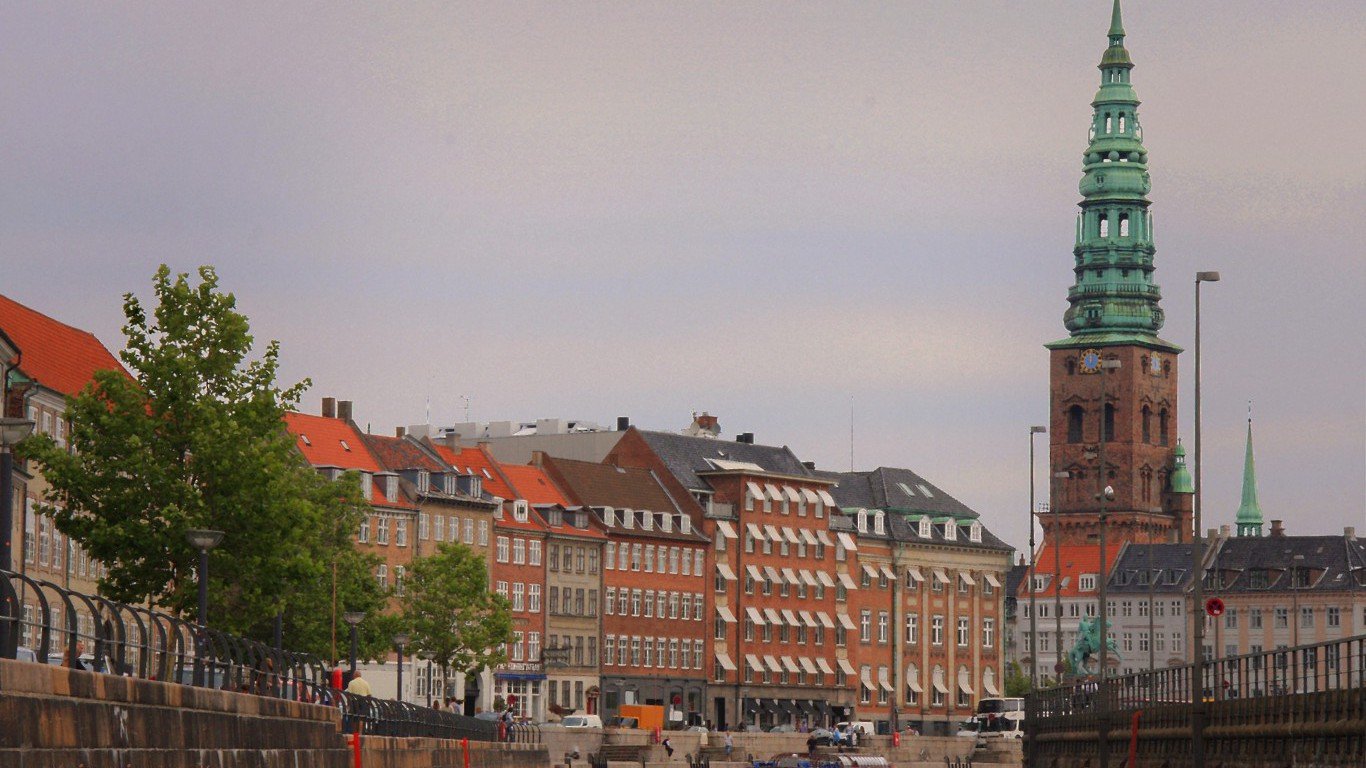
9. Denmark tied — 5th
> Visa-free travel permitted to: 178 countries
> Dual citizenship: Usually allowed
> Annual int’l departures: 9.65 million (1.68 per capita)
> GDP per capita: $49,364

8. Finland tied — 5th
> Visa-free travel permitted to: 178 countries
> Dual citizenship: Allowed
> Annual int’l departures: 9.13 million (1.66 per capita)
> GDP per capita: $43,545

7. Spain tied — 5th
> Visa-free travel permitted to: 178 countries
> Dual citizenship: Allowed
> Annual int’l departures: 15.41 million (0.33 per capita)
> GDP per capita: $38,239
[in-text-ad-2]

6. Italy tied — 5th
> Visa-free travel permitted to: 178 countries
> Dual citizenship: Allowed
> Annual int’l departures: 30.85 million (0.51 per capita)
> GDP per capita: $37,905
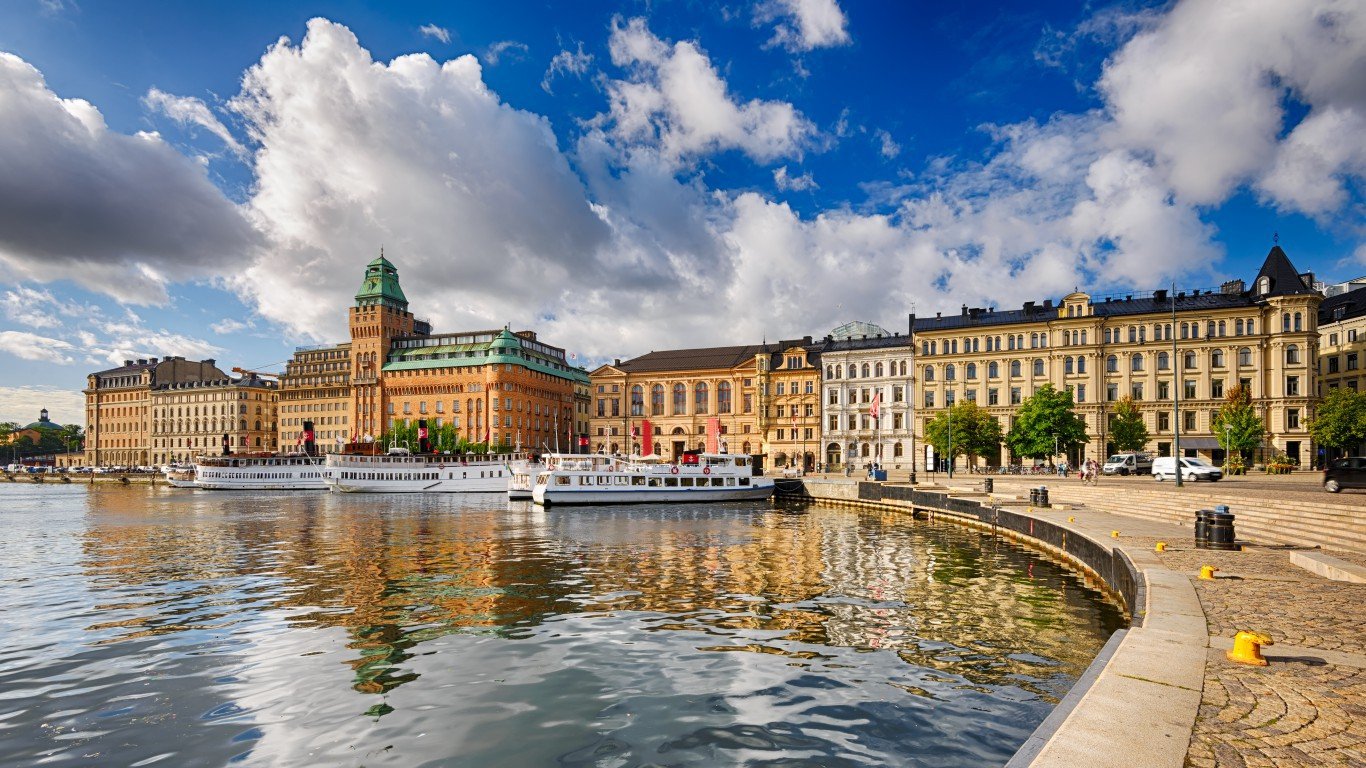
5. Sweden tied — 5th
> Visa-free travel permitted to: 178 countries
> Dual citizenship: Allowed
> Annual int’l departures: 0.00 million (0.00 per capita)
> GDP per capita: $51,377
[in-text-ad]

4. Portugal 4th
> Visa-free travel permitted to: 177 countries
> Dual citizenship: Allowed
> Annual int’l departures: 0.00 million (0.00 per capita)
> GDP per capita: $30,193

3. Switzerland tied — 2nd
> Visa-free travel permitted to: 176 countries
> Dual citizenship: Allowed
> Annual int’l departures: 13.86 million (1.66 per capita)
> GDP per capita: $61,014

2. Ireland tied — 2nd
> Visa-free travel permitted to: 176 countries
> Dual citizenship: Allowed
> Annual int’l departures: 7.65 million (1.61 per capita)
> GDP per capita: $72,529
[in-text-ad-2]

1. Luxembourg 1st
> Visa-free travel permitted to: 177 countries
> Dual citizenship: Allowed
> Annual int’l departures: 1.39 million (2.40 per capita)
> GDP per capita: $107,737
Detailed findings and methodology:
Traveling internationally can be prohibitively expensive, especially to more isolated countries as well as to citizens of those countries. However, the expense is not a big problem for many citizens of the countries on this list. Twenty of the 25 nations on this list are European. South Korea, Singapore, Australia, Canada, and New Zealand are the only exceptions. Many European countries are relatively small and geographically close together, making travel between them faster and cheaper.
Citizens of EU countries can easily travel to other nation in the EU. Further, member nations tend to be stable, democratic countries, which adds to their desirability as travel destinations. Switzerland is the only non-EU member in the top 10 of this list, though it does have a good relationship with the EU.
Each country on this list is relatively wealthy. Compared to the worldwide average gross domestic product per capita of $10,192, even the least wealthy country, Latvia, is wealthy with a GDP per capita of $27,190. Most nations with powerful passports are considerably wealthier. The highest GDP per capita is Luxembourg’s at $107,737.
Wealth is an important part of international travel, so Nomad Capitalist considered the tax burden placed on nonresident citizens in each country when ranking the most powerful passports. It also took into account the individual liberties each country offers within its borders.
Rights such as free speech, freedom of the press, and freedom from surveillance were considered in a nation’s ranking. Those freedoms affect the country’s international reputation, which is another aspect of the index. The ability for a country’s citizens to obtain dual citizenship also played a part in the rankings.
The strength of a passport facilitates international travel, and citizens of nations with powerful passports often take advantage of their privileges. In most of the countries on this list, the average person left the country at least once in 2016. Luxembourg is again at the top of the list, with the average person leaving the country 2.4 times.
Though Luxembourg is one of the smallest countries in the world at under 1,000 square miles, its citizens may not feel that confined to its geographic area. With the strongest passport, Luxembourgers can easily leave the country for travel and business.
The most important aspect of a passport is how many countries it allows access to. Passports were ranked based on how many countries they provide visa-free travel — the more countries, the more powerful the passport. Nomad Capitalist includes straightforward e-visa or visa on arrival in its visa-free definition.
Visa-free travel implies that a country’s citizens are trusted to be safe guests in another country. Holders of passports of all countries on this list can enter at least 170 different countries with ease. Singapore passports are tied with Japan as providing access to the most countries visa-free, with 180. Japan, however, did not make it on the list, likely because of its international tax rate.
Most countries offer passports that can only get the holders into fewer than 100 nations visa-free. The most restrictive passport is Afghanistan’s, which gives access to just 24 nations visa-free.
In order to determine the countries with the best passports, 24/7 Wall St. reviewed Nomad Capitalist’s 2018 Passport Index. Nomad Capitalist is an organization focused on worldwide asset diversification. The index considers a country’s taxation, international perception, and individual liberties such as free speech, as well as how many countries its citizens can travel to visa-free and whether or not it allows its citizens to hold dual citizenship. Nomad considered 199 countries in its ranking. If countries were tied, the number of visa-free travel countries was used as a tiebreaker.
Annual international departures per capita figures are based on population estimates and the total number of international departures by a country’s citizen from World Bank. The figures are for the year 2016, the most recent available. GDP per capita figures are from the International Monetary Fund. The figures are an estimate based on Purchasing Power Parity from 2017.
A financial advisor can help you understand the advantages and disadvantages of investment properties. Finding a qualified financial advisor doesn’t have to be hard. SmartAsset’s free tool matches you with up to three financial advisors who serve your area, and you can interview your advisor matches at no cost to decide which one is right for you. If you’re ready to find an advisor who can help you achieve your financial goals, get started now.
Investing in real estate can diversify your portfolio. But expanding your horizons may add additional costs. If you’re an investor looking to minimize expenses, consider checking out online brokerages. They often offer low investment fees, helping you maximize your profit.
Thank you for reading! Have some feedback for us?
Contact the 24/7 Wall St. editorial team.